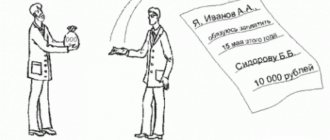Explanatory note to Sample, example: Petition for recovery of damages from the arbitration manager
This arbitration process considers the application of the Office of the Federal Service for State Registration, Cadastre and Cartography for the Sverdlovsk Region to bring the arbitration manager Elena Aleksandrovna Kiseleva to administrative liability for failure to fulfill the duties established by paragraph 4 of Article 138 of the Federal Law “On Insolvency (Bankruptcy)” dated October 26, 2002 N 127-FZ., in accordance with Part 3 of Art.
14.13 of the Code of the Russian Federation on Administrative Offences. That is, for violating the procedure for selling property that is pledged. The bankruptcy trustee held a meeting of the debtor’s creditors before the expiration of the two-month period established by paragraph 1 of Article 142 of the Federal Law “On Insolvency (Bankruptcy)” dated October 26, 2002 N 127-FZ, for the inclusion of creditors in the register of creditors’ claims, during which the implementation procedure was approved , including pledged property. As a result of this case, a fine was imposed on the bankruptcy trustee. Due to the fact that, in the author’s opinion, the fine was imposed absolutely legally, and the only possible document in this case is the bankruptcy trustee’s appeal, which, as can be seen from further materials of the case, was declared insolvent, I would like to consider possible actions in a related case - about bankruptcy.
Clause 4 of Article 20.4. The Federal Law “On Insolvency (Bankruptcy)” dated October 26, 2002 N 127-FZ provides for the assignment of losses caused by unlawful actions of the bankruptcy trustee to the debtor or creditors to the bankruptcy trustee. Due to the fact that the actions of the bankruptcy trustee were recognized as unlawful in case No. 17AP-12248/2010-GK, and the debtor incurred expenses in the form of a fee for publishing information about the auction, the author considers these expenses to be losses of the debtor, which should be recovered from bankruptcy trustee by filing a petition for recovery of damages in the court of first instance.
The author believes that during the proceedings, the bankruptcy trustee may mistakenly refer to paragraph 5. Article 4.1 of the Code of Administrative Offenses of the Russian Federation, which prohibits being held administratively liable twice for the same administrative offense, as in case No. A60-29700/2012 such was incurred previously. But since recovery of damages does not relate to administrative liability, this position will not be supported by the court.
Mistakes for which you can attract a manager
Funds are usually recovered from the bankruptcy trustee if he makes unforgivable mistakes that lead to financial losses. These errors can be different, but we tried to highlight the most common ones:
- The manager handed over his profs. responsibilities to someone else. Of course, the specifics of some bankruptcy cases are too extensive to manage everything yourself, but transferring some responsibilities is not possible.
- The queue established by law for satisfying creditor claims was ignored. The order can be changed only in cases provided by law. There can be no exceptions.
- Measures to identify the debtor's property were carried out unprofessionally. For example, the debtor's transactions were not verified. Perhaps, shortly before declaring bankruptcy, he donated some valuable property like an apartment or a car. If something like this “comes to light”, this property can be returned, and the transaction can be declared invalid.
- The professional made little effort to preserve the bankrupts' property. If during the work of the manager the debtor’s property has lost its value, it is he who must bear responsibility.
Each situation has its own nuances and operates in accordance with legal standards, and therefore requires more detailed study.
Transfer of responsibilities to other persons
Often arb. the manager receives so many responsibilities that he cannot physically cope with them. There is not enough energy or time to thoroughly study every detail. The law spells out the nuances of resolving such situations. But when the manager goes beyond the legal limits, the chance that losses will be recovered from him increases.
The fact is that the manager has the right to involve invited professionals such as appraisers, etc., in his work. This is especially true if a specialist cannot control the entire bankruptcy procedure from “A” to “Z”. But this does not relieve him of responsibility for the actions of outside specialists. If they caused losses to one of the parties, the manager will compensate them.
For example, a conflict may arise if the manager gave the digital signature carrier to someone, and this became the reason for the theft of money. Naturally, the person who transferred the product is to blame for this. In addition, the work of outside specialists is paid with the debtor’s money, so their involvement should be a necessity, not a whim.
Another point that causes a lot of controversy is when managers can involve their relatives. Situations where the names of the manager and the hired specialist are the same are especially incidental. This falls under the interest clause, and creditors have every right to ask questions to the manager, and if there are no satisfactory answers, to sue.
Violation of the order of satisfaction of creditors' claims
The order in which creditors receive money has nothing to do with moral standards, etc. Article 64 of the Tax Code of the Russian Federation clearly states who should receive money and when. It is not within the competence of the manager to decide how to reimburse funds - in turn or not.
- First, current debts are paid. They are called extraordinary.
- The first priority includes compensation for damage caused to health and life.
- The second stage consists of debts on wages and benefits. It also includes remuneration for the intellectual work of employees, vacation pay, and interest accrued during the delay. Moreover, in this case there is a queue within a queue. First, they pay the salary debt, if it does not exceed 30 thousand rubles/month, then benefits, and only then pay for intellectual property. works

- The third priority includes debts to creditors. There is also an internal sequence, according to which the main debts and % are paid first. Then fines, penalties, compensation for lost profits, etc. are paid.
After the third stage there are debts from transactions that were declared invalid. All these payments are made through the sale of the final mass. As for the pledgees, their compensation will be received only from the sale of the property that is pledged to them.
If the manager violates the sequence described above, he will be punished. Especially if, due to such a “castling,” someone did not have enough money.
Errors in identifying the debtor's property
The manager’s task is to find all the debtor’s property, which by law must be sold, and with the money received to pay off the debts that have arisen. But debtors may try in every possible way to hide the money and valuables they have. For example, they transfer apartments to relatives or friends, sell antiques, transfer and hide jewelry, etc.

If the manager does not make enough efforts to find all this hidden property or simply “cheats”, creditors may begin to investigate the matter themselves. If they find property that should have been included in the bankruptcy estate, but no one did, the trustee could be in trouble.
The manager carries out an inventory of the debtor's property, draws up and signs reports indicating all the borrower's property. All assets must be verified. To avoid any surprises, it is important to check the borrower's recent transactions. This is done in order to cancel the illegal transactions carried out. The period for verification is the last three years
Errors in ensuring the safety of the debtor's property
The main task of the manager is not only to find the property, but also to keep it intact for sale. For example, if a manager takes control of a plundered enterprise where equipment, etc. remains, he must hire security guards who will monitor and prevent intrusion into the facility. Then nothing will be stolen anymore, and hooligans won't draw on the walls.
But if everything is clear with the material side of the issue, then there may be problems with the financial side, because security needs to be paid. The manager himself will not perform the functions of a security guard. Therefore, this issue needs to be resolved with creditors. You can also appoint financially responsible persons and provide for all the risks of the procedure.
If the bankruptcy procedure takes a long time and the sale of property is delayed, it is quite possible that its value will decrease. For example, a residential building where no one has lived for a long time becomes dilapidated, equipment may break down, etc. In addition, other people may be harmed. In particular, tenants who rented out an apartment in poor condition and did not inform the manager about it.
Manager's liability insurance - why is it so important
Insurance of the manager's liability in bankruptcy cases is a relatively recent practice, dictated by the need for SROs to protect themselves from possible unprofessionalism of their members, which entails financial difficulties for the parties to the debt conflict.
Managers enter into an insurance contract as soon as they join an SRO, which assigns them to a specific case. If you don't get insurance, you won't get membership in the organization. This is due to the fact that despite high professionalism, the manager is an official whose activities (as well as his inaction) can provoke serious financial consequences. damage.
In order to compensate for these losses with the least possible consequences, an insurance contract is drawn up. This allows the SRO to remain less vulnerable, even if his ward does commit an offense that causes losses.
The main insurance contract is drawn up for a year, and its amount is three million rubles. But there are exceptional cases when an additional procedure is required. For example, if the debtor’s property is more expensive than the amount indicated above.
The essence of the insurance contract, which is concluded between fear. the company and the insured to pay compensation to the victims in the event of losses. To do this, if such a measure comes, you need to make timely contributions.
As for those to whom insurance payments are intended, these are always third parties, which include:
- creditors who want to get money that the debtor owes them;
- people to whom the insured person is a debtor.
Insurance usually only covers direct damage, proven in court. Also, fear. the company can compensate the court. fees and expenses, as well as some legal expenses that were used to prove the existence of a causal relationship between the damage and the manager who caused it.
We have already briefly mentioned the amount of insurance, but there are many nuances that will help you understand the procedure under consideration in more detail. For example, the large capital that the debtor has.
- Property worth more than 100-300 million rubles. – 3% of this cost.
- The value of assets is 300 million rubles. – 1 billion rubles. – 2%+6 million rub.
- More than 1 billion rubles. – 1%+20 million rub.
If the value of assets is less than 100 million rubles, the standard amount is used - 3 million rubles.
An interesting nuance: if the manager is involved in several cases, and the assets in each do not exceed 100 million, in such situations an additional agreement is not drawn up. If the debtors' assets are more than hundreds of millions, additional. A contract is needed for every case.

Insurance companies actively take on such cases, as it is beneficial for all parties. Managers will take a more responsible approach to their work, risking their property rights, and interested parties will receive compensation even if the financial law is unprofessional. Although it is worth noting that this procedure is still new for Russia, but thanks to the experience of foreign countries it is being successfully mastered.
Transferring your professional responsibilities to third parties
A specialist has a lot of responsibilities. If there are too many of them, he may become unable to cope with them. Sometimes a professional decides to delegate some of his powers to third parties. For example, in one of the real cases, a specialist transferred an electronic digital signature carrier to another person. Funds were transferred using this tool. The judicial authority decided that the actions of third parties do not relieve the manager from liability.
Ignoring the order of repayment of creditors' claims
The manager must follow the order of repayment of claims. Even if ignoring this order is caused by objective reasons, this does not relieve the professional from responsibility.
For example, the manager transferred one month’s salary to the bankrupt’s staff. However, the payment was not transferred to the personal income tax budget. In the actions of such a manager, grounds for collecting damages were found.
Unprofessional identification of the debtor's property
During the period of recognition of insolvency, the debtor cannot alienate his property. In essence, this will be a concealment of property. All of a bankrupt's property can potentially be used to pay off creditors' debts. Therefore, alienation is illegal.
The manager must monitor the safety of the property. However, he may be careless in his duties. For example, trust the previous inventory, skipping the operation of alienation of property.
Legislative side of the issue
To correctly assess the situation regarding the recovery of losses from the manager, you need to familiarize yourself with the legislation in more detail. Initially, the candidacy of Arb. The manager is selected based on the requirements specified in Art. 20.2 FZ-127. But judicial practice also takes into account the fact that almost all SROs can approve candidates for managers, taking into account their own list of requirements. They create their own selection procedure, which can be a little disorienting.
However, the rules are almost always the same. Arb. the manager must navigate the legislation of the country and meet the listed requirements. In addition, he must be a specialist in such areas of legislation as:
- tax;
- criminal;
- administrative;
- civil.
A specialist is removed only on the grounds listed in Art. 20.5.
But there is a lot of interesting information in other parts of the article. For example, Art. 20.3 provides a complete list of the manager’s responsibilities. It also states here that failure to fulfill direct duties is guaranteed to entail prosecution.
Responsibility is discussed in more detail in the fourth part of the same article (Article 20.4). It states here that the manager will be forced to compensate for losses that arose due to improper fulfillment or neglect of professional obligations. Moreover, the amounts can be any. Especially for managers whose rights were as broad as possible.
To recover damages, you must have a court decision, which has already entered into force. Therefore, the issue of collection is considered at the plenum. In the fifth paragraph of Art. 20 specifies additional requirements. For example, they are described in fed. standards or rules of the prof. work, etc.









